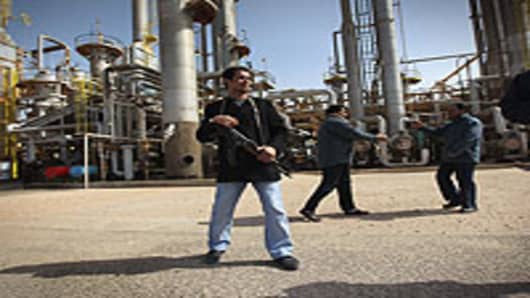Libyan rebels are set for their first oil export as soon as Tuesday as they seek funding to sustain their uprising against Muammer Gaddafi's 41-year ruleof the north African nation.
The Liberia-flagged Equator tanker was off Port Said, Egypt, early on Monday and is expected to dock at the Marsa el-Hariga crude oil export terminal near Tubruq, in east Libya, on Tuesday morning, according to Lloyd's Intelligence, the shipping industry data provider.
The owner of the tanker, Greek-based Dynacom Tankers Management Ltd, declined to comment when contacted by the Financial Times. Dynacom is Greece's third-largest tanker operator.
Oil traders and tanker shipbrokers said they did not know who had chartered the vessel, a Suezmax built in 1996 capable of carrying about 1 million barrels of oil. Qatar last week offered to market the Libyan rebels' oil. At current prices, 1 million barrels of east Libyan oil should sell for about $125 million.
The resumption of oil exports did not, however, placate the commodities market. Brent crude, the global benchmark, surged to a fresh 2½-year high of nearly $120 a barrel on Monday. Traders remain worried about the conflict in Libya, unrest elsewhere in the Middle East and a strike in the African nation of Gabon which has disrupted the production of about 240,000 barrels a day of crude oil since Friday.
Libya's production has dropped to a trickle from a pre-crisis level of 1.6 million barrels per day (b/d), triggering a price rally in global oil markets and forcing Saudi Arabia, the world's largest oil exporter, to boost its output to offset the shortfall.
But the rebel-controlled Arabian Gulf Oil Company, which broke links with Libya's state-owned National Oil Company early in the conflict, has about 3 million barrels of oil stored at Tubruq's terminal. The terminal is also linked through a pipeline with the Sarir oilfield, the country's largest in the Sirte basin.
Agoco last week said it was producing about 100,000 b/d, down from a pre-crisis level of more than 400,000 b/d. Agoco uses part of that production at two refineries - in Tubruq and Sarir - that supply the rebels with petrol.
Samuel Ciszuk, senior Middle East energy analyst at IHS Global Insight, a consultancy, said that the resumption of oil exports carried the risk of an attack on the rebel's oilfields by forces loyal to Col Gaddafi.
"Given the organizational, logistical and firepower superiority on the battlefield of the regime's forces, it would be highly surprising if they did not move in to try to disrupt oil flows to Marsa El-Harigh, perhaps by striking at the long pipeline connecting the Sirte Basin to the port," he said on Monday in a note to clients.
Washington has made clear that opposition oil sales would not be subject to the sanctions imposed on Col Gaddafi's government. However, US Treasury officials have cautioned that the rebels would have to create a payment mechanism that did not involve the National Oil Company or any other government institution.



